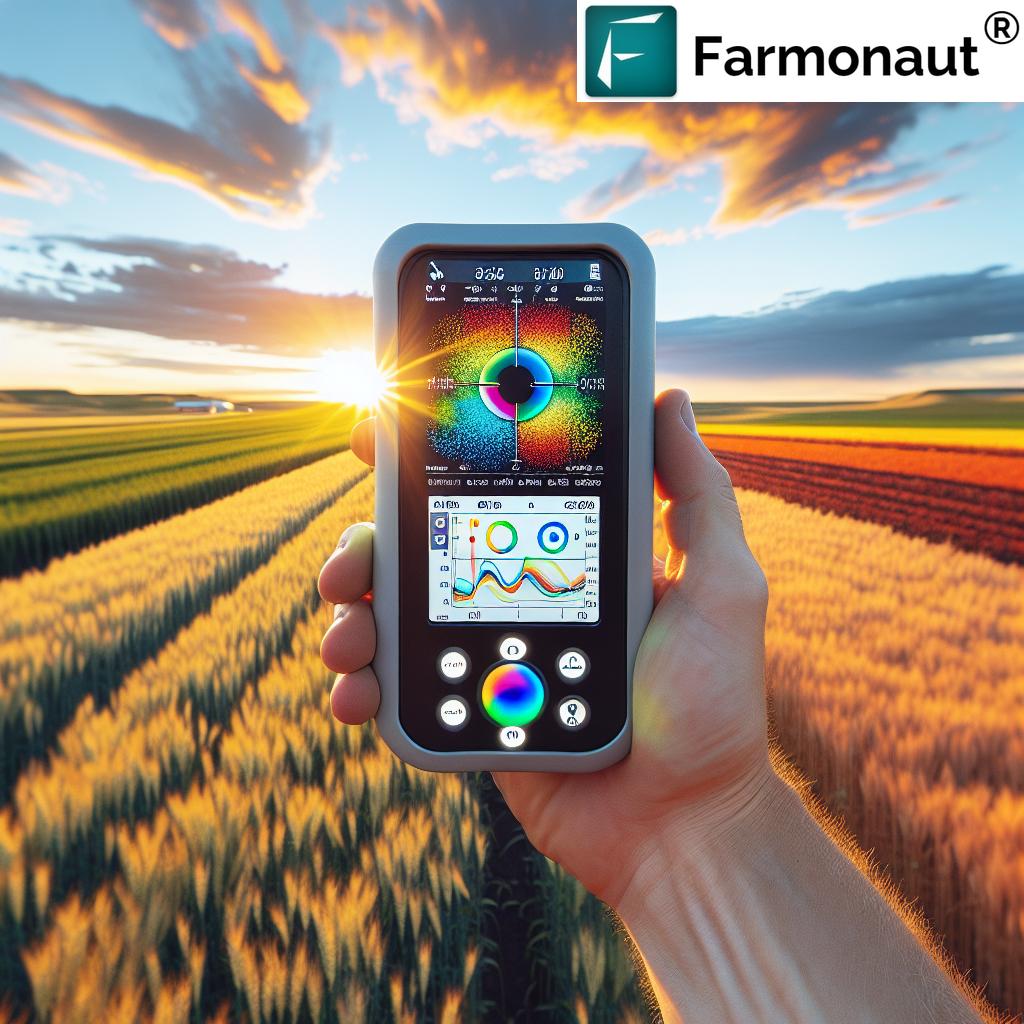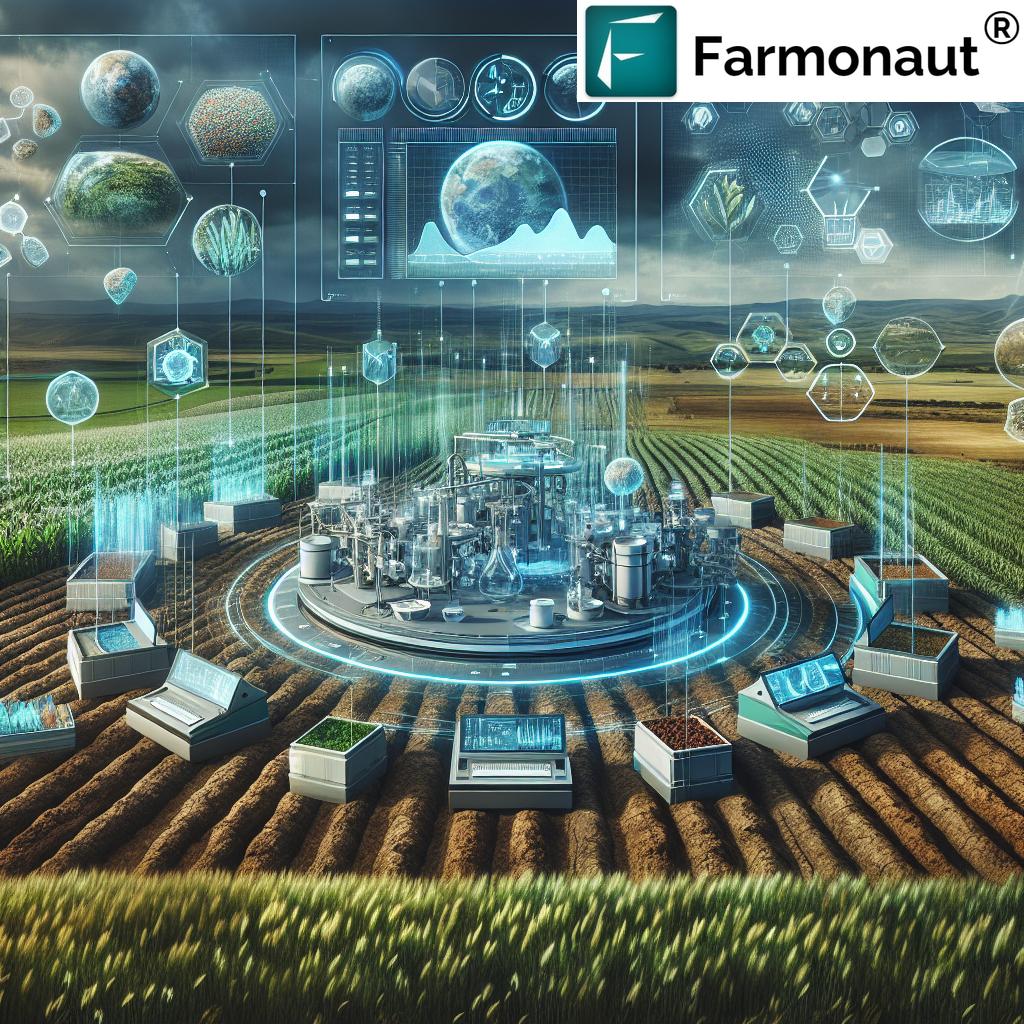Revolutionizing Saskatchewan Agriculture: How Soil Spectroscopy Is Transforming Fertility Testing for Sustainable Farming

“Spectroscopy-based soil testing can analyze multiple soil properties simultaneously, potentially reducing analysis time by up to 90%.”
In the heart of Canada’s prairies, a groundbreaking revolution is taking root, transforming the way we approach soil fertility testing and sustainable agriculture. As we celebrate World Soil Day on December 5th, the University of Saskatchewan (USask) stands at the forefront of innovation, spearheading research that promises to reshape the future of farming not only in Saskatchewan but across the globe.
At Farmonaut, we’re excited to explore this cutting-edge research and its potential impact on agriculture. As pioneers in satellite-based farm management solutions, we understand the critical role that soil health plays in sustainable farming practices. Let’s delve into how spectroscopy in agriculture is set to revolutionize the industry and how it aligns with our mission to make precision agriculture accessible to farmers worldwide.
The Dawn of Rapid Soil Diagnostics
Dr. Derek Peak and PhD candidate Gbenga Adejumo from USask’s College of Agriculture and Bioresources are leading the charge in developing a portable soil analysis device that could transform how we assess soil fertility. Inspired by sci-fi concepts of instant diagnostics, their research aims to bring this futuristic vision to reality in the agricultural sector.
The core of their innovation lies in spectroscopy – a sophisticated technique that uses light to analyze soil samples. This method has the potential to provide instant data on crucial soil properties, including:
- Organic carbon content
- Nitrogen levels
- Moisture retention
- Soil texture
The implications of this technology are vast. Imagine a world where farmers can obtain immediate, accurate soil data without the need for time-consuming and costly laboratory tests. This is the future that Dr. Peak and Adejumo are working towards, and it’s a future that aligns perfectly with Farmonaut’s vision of accessible precision agriculture.
The Journey from Lab to Field
Over the past four years, the USask team has been utilizing advanced light technology at the Canadian Light Source to study soil samples from various agricultural lands across Saskatchewan. This meticulous research forms the foundation for developing models that can accurately measure soil properties using spectral data.
However, the journey from laboratory research to practical field applications presents its own set of challenges. The team recognizes that large-scale implementation may face compatibility issues, which is why they’re focused on creating a user-friendly, handheld solution.
Dr. Peak envisions a future where farmers can simply point a device at a soil sample and receive immediate analysis. This level of accessibility and speed in soil testing could revolutionize decision-making processes in agriculture, allowing for more timely and precise interventions in crop management.
Global Implications for Sustainable Agriculture
While the current focus of this research is on Saskatchewan soils, the potential global impact is immense. Adejumo’s experience in Nigeria and the Benin Republic has highlighted the critical need for affordable and accessible soil testing solutions, particularly in developing countries where laboratory facilities are scarce.
“A portable soil spectroscopy device could provide instant results for 4 key soil parameters: organic carbon, nitrogen, moisture, and texture.”
This research is not just about technological advancement; it’s about improving food security through soil science. By providing farmers with immediate access to crucial soil data, we can enhance crop yields, optimize resource use, and promote sustainable agricultural practices on a global scale.
At Farmonaut, we understand the importance of such innovations in advancing global agriculture. Our satellite-based crop health monitoring and AI-driven advisory systems complement these soil testing advancements, offering farmers a comprehensive toolkit for precision agriculture.

Overcoming Challenges in Spectral Sensing
Adapting spectroscopy for diverse soil types and climates is a complex task that forms a significant part of Adejumo’s doctoral thesis. The team is working diligently to ensure that their models accurately reflect soil conditions in various environments. One of the key challenges they’re addressing is the presence of carbonate minerals, which can affect carbon measurement accuracy.
This meticulous approach to model development is crucial for creating a reliable spectral sensing for soil testing tool. By addressing these challenges, the research team is paving the way for a universally applicable soil analysis method that could benefit farmers across different geographical regions.
The Promise of Non-Destructive Soil Testing
One of the most exciting aspects of this innovative soil fertility research is its potential to offer quick, eco-friendly, and non-destructive soil fertility evaluations. Traditional soil testing methods often require physical sampling and chemical analysis, which can be time-consuming, expensive, and potentially harmful to the environment.
In contrast, spectroscopy-based testing offers several advantages:
- Rapid results, potentially reducing testing time from weeks to minutes
- Significant cost reduction in soil analysis
- Minimal environmental impact due to non-destructive testing methods
- Ability to perform frequent tests without damaging soil structure
These benefits align perfectly with Farmonaut’s mission to promote sustainable agricultural practices. Our satellite-based monitoring systems, combined with such advanced soil testing methods, could provide farmers with an unprecedented level of insight into their land’s health and productivity.
Revolutionizing Agricultural Soil Mapping
Agricultural soil mapping is set to undergo a significant transformation with the advent of portable spectroscopy devices. Traditional mapping methods often rely on sparse sampling due to the high costs and time constraints associated with laboratory testing. However, with rapid, on-site soil analysis capabilities, we can envision a future where soil maps are incredibly detailed and frequently updated.
This level of detail in soil mapping could lead to:
- More precise nutrient management strategies
- Better understanding of soil variability within fields
- Improved crop rotation and planting decisions
- Enhanced water management practices
At Farmonaut, we recognize the potential of combining such detailed soil data with our satellite imagery and AI-driven insights. This integration could provide farmers with a comprehensive view of their land, from the sky down to the soil particles, enabling truly precise and sustainable farming practices.
Empowering Farmers with Real-Time Data
The ultimate goal of this research is to empower farmers with instant access to critical soil information. By the end of their project, Peak and Adejumo anticipate creating a pathway for direct field applications of lab-based spectroscopy. This breakthrough could revolutionize the way soil fertility is assessed, especially in developing nations where access to traditional soil testing facilities is limited.
For farmers, this means:
- Ability to make informed decisions on-the-spot
- Optimized use of fertilizers and other inputs
- Improved crop yields through precise soil management
- Reduced environmental impact of farming practices
This aligns perfectly with Farmonaut’s vision of democratizing access to precision agriculture tools. Our platform, which offers real-time crop health monitoring and AI-based advisory systems, complements these soil testing advancements, providing farmers with a comprehensive toolkit for sustainable and efficient farming.
The Role of Spectroscopy in Soil Carbon Measurement
Soil carbon measurement is becoming increasingly important in the context of climate change and sustainable agriculture. Spectroscopy offers a promising solution for rapid and accurate carbon content assessment, which is crucial for:
- Monitoring soil health and fertility
- Assessing carbon sequestration potential
- Implementing carbon credit systems in agriculture
- Evaluating the effectiveness of conservation practices
Farmonaut’s carbon footprinting feature aligns well with these advancements in soil carbon measurement. By combining spectroscopy-based soil data with our satellite monitoring capabilities, we can provide farmers and agribusinesses with comprehensive insights into their carbon footprint and sequestration potential.
Comparative Analysis: Traditional vs. Spectroscopy-Based Soil Testing
| Testing Method | Time Required | Cost Estimate | Accuracy (%) | Portability | Environmental Impact | Data Accessibility |
|---|---|---|---|---|---|---|
| Traditional Laboratory Testing | 1-2 weeks | High | 95-99 | Low | Moderate | Delayed |
| Spectroscopy-based Portable Device | Minutes | Low | 90-95 | High | Low | Immediate |
This comparison clearly illustrates the potential advantages of spectroscopy-based soil testing. While traditional methods offer slightly higher accuracy, the speed, cost-effectiveness, and environmental benefits of spectroscopy make it a game-changing technology for modern agriculture.
The Future of Sustainable Farming
As we look to the future, the integration of technologies like soil spectroscopy, satellite imaging, and AI-driven analytics promises to usher in a new era of sustainable and efficient farming. At Farmonaut, we’re excited to be part of this agricultural revolution, offering tools that complement and enhance these emerging technologies.
Our platform provides:
- Real-time crop health monitoring using satellite imagery
- AI-powered advisory systems for precision agriculture
- Resource management tools for optimized farming operations
- Blockchain-based traceability for transparent supply chains
By combining these capabilities with advanced soil testing methods, farmers can gain unprecedented insights into their land and crops, enabling truly data-driven decision-making.
Conclusion: A New Dawn for Agriculture
The innovative soil fertility research being conducted at the University of Saskatchewan represents a significant leap forward in agricultural science. By harnessing the power of spectroscopy, we’re on the cusp of a revolution in soil testing that promises to make precision agriculture more accessible, efficient, and sustainable than ever before.
At Farmonaut, we’re committed to being at the forefront of this agricultural transformation. Our suite of tools, from satellite-based crop monitoring to AI-driven advisory systems, complements these emerging soil testing technologies, offering farmers a comprehensive toolkit for modern, sustainable agriculture.
As we celebrate World Soil Day, let’s recognize the critical importance of soil health in ensuring global food security and environmental sustainability. The advancements in soil spectroscopy, combined with technologies like those offered by Farmonaut, are paving the way for a future where farming is not only more productive but also more in harmony with our planet’s ecosystems.
Together, we can build a future of agriculture that is sustainable, efficient, and capable of meeting the world’s growing food needs while preserving our precious soil resources for generations to come.
FAQ Section
Q1: What is soil spectroscopy?
A1: Soil spectroscopy is a technique that uses light to analyze soil samples, providing information about various soil properties such as organic carbon content, nitrogen levels, moisture, and texture. It offers a rapid, non-destructive method for soil analysis compared to traditional laboratory testing.
Q2: How does spectroscopy-based soil testing differ from traditional methods?
A2: Spectroscopy-based testing is faster, more cost-effective, and less environmentally impactful than traditional lab methods. It provides instant results in the field, whereas traditional testing can take weeks and requires soil samples to be sent to a laboratory.
Q3: What are the potential benefits of portable soil spectroscopy devices for farmers?
A3: Portable devices would allow farmers to conduct on-site soil analysis, providing immediate data for informed decision-making. This can lead to optimized use of fertilizers, improved crop yields, and more sustainable farming practices.
Q4: How accurate is spectroscopy-based soil testing compared to traditional methods?
A4: While slightly less accurate than traditional lab methods, spectroscopy-based testing still achieves high accuracy levels (90-95%) while offering significant advantages in speed, cost, and convenience.
Q5: How can spectroscopy contribute to sustainable agriculture?
A5: By providing rapid, accurate soil data, spectroscopy enables more precise nutrient management, reduces over-application of fertilizers, and helps in monitoring soil health. This leads to more sustainable farming practices and reduced environmental impact.
Q6: What role does Farmonaut play in advancing precision agriculture?
A6: Farmonaut offers satellite-based crop health monitoring, AI-driven advisory systems, and resource management tools. These technologies complement advancements in soil testing, providing farmers with comprehensive data for precision agriculture.
Q7: How can farmers access Farmonaut’s services?
A7: Farmers can access Farmonaut’s services through our web and mobile applications. We offer various subscription packages tailored to different farm sizes and needs.
Explore Farmonaut’s Solutions
Ready to take your farming to the next level? Explore Farmonaut’s innovative agricultural solutions:
For developers interested in integrating our satellite and weather data into their own systems, check out our API and API Developer Docs.
Farmonaut Subscriptions






